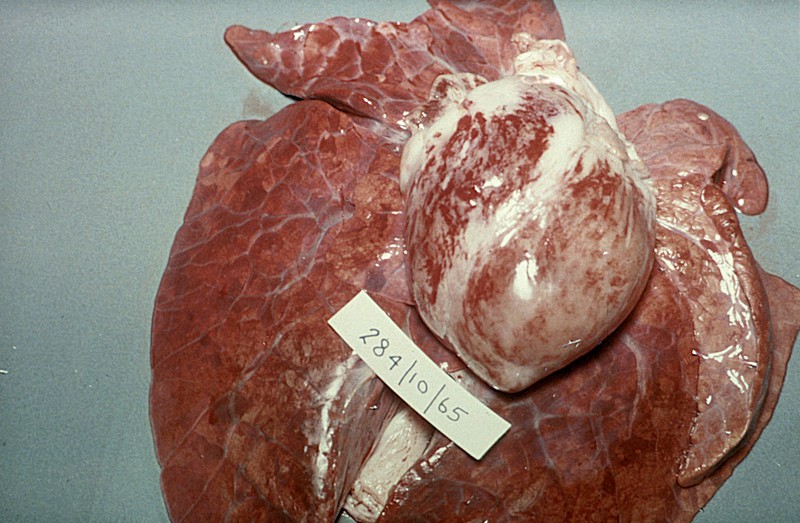Cardiovascular disorders
Mulberry Heart Disease
Clinical importance
Mulberry heart disease is not extremely common but a swine practitioner may encounter cases sporadically and should be familiar with its clinical presentation. It is a nutritional disorder due to vitamin E and selenium deficiency. It causes sudden death and cardiovascular modifications in nursery-aged pigs.
Etiology
Mulberry heart disease is a disease of fast-growing, healthy-looking pigs. It is caused by a deficiency of vitamin E and selenium in the diet. Affected pigs are in the nursery phase and are usually the largest ones in a pen. Morbidity and mortality are usually low unless there is an error of dosage in the diet.
Associated symptoms
Most often, mulberry heart disease is associated with sudden mortality thought to happen due to arrhythmia associated with myocardial lesions. In rare cases, icterus , cyanosis and tachycardia can be observed.
Associated lesions
Macroscopic lesions
At necropsy, an increased amount of clear fluid can be noticed in the pericardium. The surface of the heart displays multiple areas of hemorrhage giving it the appearance of a mulberry, hence the name of the disease. Areas of necrosis, looking like pale streaks on the heart can also be present. Pulmonary edema can also be noticed.

Microscopic lesions
Multifocal areas of necrosis, myofiber degeneration and hemorrhage are visible in the myocardium. Hepatocellular necrosis and degeneration of the skeletal muscle can also be seen.
Diagnosis
The diagnosis is usually done by observation of the macroscopic lesions at necropsy. Further diagnostic testing can be done by submitting the liver for analysis.
Differential diagnosis
Differential diagnosis should include all causes of sudden death in nursery-age pigs. Most commonly Streptococcus suis, Glaesserella parasuis, gastric ulcers should be included.
Treatment, Prevention and Control
Injectable vitamin E and selenium products are available and effective in preventing mulberry heart in fast-growing pigs. However, one needs to be careful not to cause selenium toxicity. Treatment is usually not possible due to the quick mortality associated with the disease.

